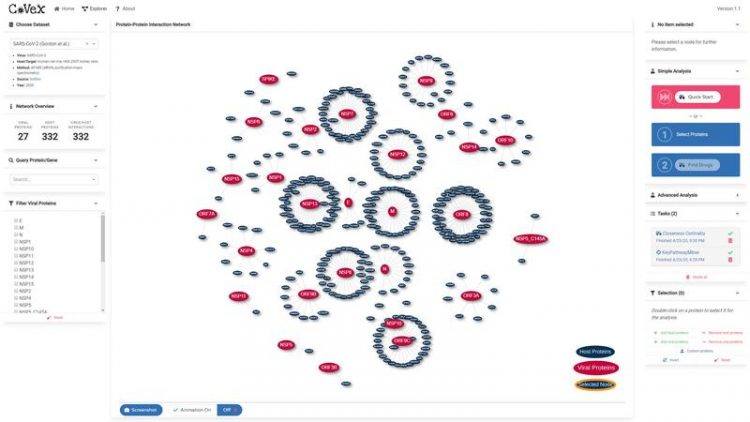TUM researchers develop software for drug repurposing

CoVex Screenshot Prof. Jan Baumbach
In order to find out which existing drugs might be suitable for the treatment of Covid-19, numerous research groups from all over the world are working on systems medicine approaches.
A research team from the Chair of Experimental Bioinformatics (ExBio) at the TUM School of Life Science of the Technical University of Munich (TUM) has now developed the first online data analysis platform for this purpose.
Systems Medicine and Artificial Intelligence for data analysis
The so-called Coronavirus Explorer (CoVex) integrates the virus-human interactome for SARS-CoV-2 and SARS-CoV. CoVex is designed to help provide a comprehensive understanding of the infection mechanisms and focuses not only on the virus and its direct interaction partners, but in particular involves the host-protein interaction network.
“The goal of CoVex is to make data more accessible and analyzable with the help of Artificial Intelligence, even for non-computer scientists such as virologists. The virus-host interactome of SARS-CoV-2 serves as the basis for our systems medicine approach,” explains Prof. Jan Baumbach, head of the Department of Experimental Bioinformatics.
Identification of drug repurposing candidates for treatment of Covid-19
“In particular, candidates for the reuse of known active substances are to be identified using CoVex. These do not target – as most of the existing drugs – directly the proteins of the virus, but against interaction partners in human cells. This makes it more difficult for the virus to escape treatment by mutating its own genome. This can be of great importance in possible future epidemic waves,” said Baumbach.
“Our network-based approach can significantly accelerate the identification of potential drugs for the treatment of COVID-19,” said Prof. Baumbach.
Data analysis platform publicly available
CoVex is therefore available to biological, medical and computer-based researchers as well as to the general public. Users can already view the latest available molecular data on SARS-CoV-2 and perform systems medicine analyses at https://exbio.wzw.tum.de/covex/.
However, Prof. Baumbach emphasizes that CoVex is a method for predicting possible future drugs for COVID-19, which have not yet undergone more intensive preclinical or clinical validation.
“Under normal circumstances, we would not have gone public with CoVex at this point in time, but since the main functionality is implemented, we believe that this first version is already extremely useful for many researchers,” said the chair holder.
In the coming weeks, CoVex will be continuously updated, for example by incorporating the latest experimental data for SARS-CoV-2 and implementing new functionalities. Furthermore, predicted candidates for new COVID-19 drugs will be pre-clinically tested and investigated.
Prof. Dr. Jan Baumbach
Technical University of Munich
Chair of Experimental Bioinformatics
TUM School of Life Sciences
Tel.: +49-8161-71-2136
E-Mail: exbio@wzw.tum.de
CoVex was developed in a ca. 10-day hackaton project at the Chair of Experimental Bioinformatics at the Technical University of Munich in Germany. The tool is publicly available and free to be used. It's development and functionalities and decision-making is documented in public blogs:
https://www.exbio.de/exbio-vs-covid-part-1
https://www.exbio.de/exbio-vs-covid-part-2
https://www.youtube.com/watch?v=H9pbYQFlt6U (Video introduction)
https://www.tum.de/nc/en/about-tum/news/press-releases/details/35999/ (Press Release)
https://mediatum.ub.tum.de/1544195 (Images for journalists)
Media Contact
All latest news from the category: Information Technology
Here you can find a summary of innovations in the fields of information and data processing and up-to-date developments on IT equipment and hardware.
This area covers topics such as IT services, IT architectures, IT management and telecommunications.
Newest articles

An Endless Loop: How Some Bacteria Evolve Along With the Seasons
The longest natural metagenome time series ever collected, with microbes, reveals a startling evolutionary pattern on repeat. A Microbial “Groundhog Year” in Lake Mendota Like Bill Murray in the movie…

Witness Groundbreaking Research on Achilles Tendon Recovery
Achilles tendon injuries are common but challenging to monitor during recovery due to the limitations of current imaging techniques. Researchers, led by Associate Professor Zeng Nan from the International Graduate…

Why Prevention Is Better Than Cure—A Novel Approach to Infectious Disease Outbreaks
Researchers have come up with a new way to identify more infectious variants of viruses or bacteria that start spreading in humans – including those causing flu, COVID, whooping cough…



